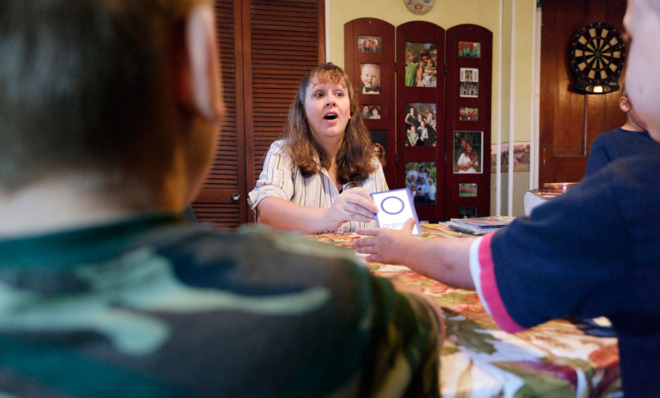Does home schooling make kids more politically tolerant?
A new study has some surprising findings

A free daily email with the biggest news stories of the day – and the best features from TheWeek.com
You are now subscribed
Your newsletter sign-up was successful

When it comes to home schooling, the term "politically tolerant" usually doesn't spring to mind. Even while the home schooling phenomenon continues to grow and diversify in the United States, the image of conservative Christian home schoolers as either Machiavellian partisans or reclusive fundamentalists still holds considerable sway in broader society.
A recently published study, however, challenges that perception. University of Arkansas researcher Albert Cheng compared the political tolerance of college students who had been home schooled with those who had not.
Cheng defined political tolerance as "the willingness to extend basic civil liberties to political or social groups that hold views with which one disagrees." In the study, 304 students at a private Christian university were first asked to identify the social or political group whose beliefs were most strongly antithetical to their own. These students were then asked a series of questions to measure how politically tolerant they were of that group.
The Week
Escape your echo chamber. Get the facts behind the news, plus analysis from multiple perspectives.

Sign up for The Week's Free Newsletters
From our morning news briefing to a weekly Good News Newsletter, get the best of The Week delivered directly to your inbox.
From our morning news briefing to a weekly Good News Newsletter, get the best of The Week delivered directly to your inbox.
The results showed that study participants who had been home schooled prior to college were actually more politically tolerant than those who had attended public schools. And the more years of home schooling they had, the more politically tolerant they were.
This research provides at least a preliminary rebuttal to the concern raised by some detractors of home schooling that this form of education, particularly when practiced by conservative Christians, produces students with less political tolerance for fellow citizens.
Don't forget civic engagement
But while Cheng's study offers useful empirical insight on the question of political tolerance, his presentation becomes less convincing when he offers broader generalizations about the civic development of home schoolers.
A free daily email with the biggest news stories of the day – and the best features from TheWeek.com
As Milton Gaither of the International Center for Home Education Research points out in a recent review, the empirical research on how home schooled children are engaged in the governance of their communities is more complicated than Cheng asserts.
Yes, some studies contend that home-school families are more civically engaged than public school families. But other researchers have indicated otherwise.
Similarly, Cheng's assertion that home schoolers attain a higher degree of self-actualization — developing a strong sense of identity — is far from compelling. He suggests this may enable greater political tolerance, but the research is decidedly mixed. My own study, which Cheng cites, actually raises more questions than it answers about the complexity of home schooler socialization.
How to be a good citizen
But I think there's an even more significant issue to consider here. The central emphasis of political theorists such as Rob Reich who argue for more regulation of home schooling isn't simply a concern about whether it cultivates or holds back political tolerance. That's not what they see as the primary civic function of public education.
Schools have a more demanding task, one that requires students to genuinely engage with a variety of perspectives, beliefs and visions of the good life — not simply so they can tolerate them, but so they can understand and appreciate what matters to their fellow citizens and why.
The survey questions Cheng used don't ask much of citizens. He asked whether the students at the Christian university would like it if people who held differing political views from them taught in public schools, made a public speech, ran for political office, or held demonstrations. These hardly constitute the height of civic virtue.
A more revealing — and certainly more civically demanding — set of questions might include: Are you willing to seek areas for possible compromise with this group? Do you seek out the strengths of your opponents' arguments, or just focus on their weaknesses? Do we have an obligation to try to accommodate the beliefs of those with whom we disagree?
Some observers might reply that politics is about power: while we should always concede basic civil liberties, we have no obligation to seek compromise or accommodation if we have the political power to shape society according to our own vision of the good life.
But such a vision of civic engagement, with political tolerance as the primary criterion, is insufficient for a healthy liberal democracy. It certainly doesn't get us very far towards the open-minded co-operation necessary for a diverse population to construct a vibrant civic life together.
This is not to say, of course, that public schools have achieved this civic goal either. But as different forms and structures of education continue to proliferate across the world — private and charter schools, home schools, virtual schools, and so on — the complicated question of what it means to prepare citizens to sustain democracy deserves our emphasis and attention.
More from The Conversation...
PISA education rankings are a problem that can't be solved
-
 How the FCC’s ‘equal time’ rule works
How the FCC’s ‘equal time’ rule worksIn the Spotlight The law is at the heart of the Colbert-CBS conflict
-
 What is the endgame in the DHS shutdown?
What is the endgame in the DHS shutdown?Today’s Big Question Democrats want to rein in ICE’s immigration crackdown
-
 ‘Poor time management isn’t just an inconvenience’
‘Poor time management isn’t just an inconvenience’Instant Opinion Opinion, comment and editorials of the day